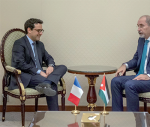You are here
Loss of trust led to protracted negotiations in Vienna talks
Feb 23,2022 - Last updated at Feb 23,2022
Talks in Vienna are closer than ever to agreement on reviving the 2015 agreement for limiting Iran's nuclear programme in exchange for lifting sanctions imposed after the US aborted the deal three years later. Speaking at the Munich security conference last weekend, Iranian Foreign Minister Hossein Amir-Abdollahian dangled an irresistible confidence building measure before the US. He said Tehran is ready to make a prisoner swap immediately and hold talks directly with Washington if the US makes a goodwill gesture by unblocking $8 billion in Iranian funds held in foreign banks. The prisoner exchange would be outside the projected deal.
It is not, however, clear whether Tehran is prepared to free prisoners from Western countries other than the four from the US. Iran is also detaining four from Britain, two from Canada, two each from France and Austria, and one each from Germany, Holland and Sweden. Most are dual citizens; several are permanent residents of these countries. The common charge is espionage.
The US does not have a list of Iranian citizens jailed or detained while under prosecution in that country but the Justice Department identified 12 Iranians held for alleged or proven federal crimes associated with Iran, the majority for violating US sanctions on Iran. One resident has been charged as acting illegally as an Iranian agent and another with transferring US technology to Iran.
Tehran says an exchange of prisoners would set the stage for direct talks with the US which has been negotiating indirectly in Vienna since it is no longer a signatory of the Joint Comprehensive Plan of Action, (JCPOA), the proper designation for the nuclear deal. The remaining signatories are China, Russia, Britain, France and Germany. European Union official Enrique Mora has been acting as go-between and has been tasked with drawing up a text of a new agreement. It is hoped the deal will be signed by March 7th, ahead of the board meeting of the International Atomic Energy Agency.
It is reported that the process of returning to compliance would begin with US release of $7 billion in Iranian funds in South Korean banks and Tehran's suspension s and Iranian suspension of uranium enrichment above 5 per cent purity.
Once this is accomplished, the US would lift sanctions and provide 90-day waivers for Iran to export oil freely in return for Iran's reversion to the terms of the original deal. Tehran would limit enrichment to 3.67 per cent, export stockpiles, warehouse advanced centrifuges, and grant UN inspectors full access to nuclear facilities.
There are two issues which have stalled agreement: Iran demands verification that the US has lifted sanctions as it did not meet its commitments to the 2015 deal and guarantees that the US will not withdraw again and the other signatories will abide by the agreement. They stepped back after May 2018 when Donald Trump aborted and threatened to impose sanctions on any who dealt with Iran.
Both issues are connected with trust. Iran does not trust the US, in particular. Trump's abandonment of the JCPOA and imposition of 1,500 sanctions has eroded broad trust in the US as a country. This goes for Iran and the other signatories on the JCPOA as well as other countries. Loss of trust has led to the protracted negotiations in Vienna and repeated rumours of collapse as well as of success.
The chaotic withdrawal of the US and NATO from Afghanistan last August and abandonment of its people to hunger, illness and extreme poverty under Taliban rule has created specific mistrust of President Joe Biden and his clueless administration.
Widespread international trust in the US had previously been eroded by the lies Washington told to jusitfy the disastrous 2003 war on Iraq. Last week, the current US Secretary of State Antony Blinkin had to reassure allies that the US was not inventing a new "dodgy dossier", i.e., fake intelligence, to justify adopting harsh measures against Russia for surrounding Ukraine with military forces.
Iran has a long history of distrusting the US. This began in 1953 when the US orchestrated a coup against democratically elected Prime Minister Mohammed Mossadegh, who sought to limit the Anglo-Iranian Oil Company's control over Iran's energy resources. The coup, carried out by the US along with Britain, ended Iran's democratic governance and boosted the powers of Shah Reza Pahlavi who became dependant on external support to remain on the throne. Since Iranians believe the coup deprived them of democracy, Mossadegh's ouster created longstanding popular resentment and ultimately led to the 1979 overthrow of the Shah by the current regime. Iranians who oppose the current government are doubly resentful.
Iranians also resent the refusal of the US to engage with Tehran even though three moderate presidents — Hashemi Rafsanjani, Mohammad Khatami and Hassan Rouhani — sought to reach a modus vivendi with Washington. Instead, the US has isolated and piled on punitive sanctions which have undermined Iran’s economy and impoverished its population.
Iranians put their trust in the JCPOA to end ostracism and sanctions but the Obama administration, which negotiated and signed the deal, reneged on its commitment by imposing secondary sanctions on governments, firms and individuals seeking to do business and invest in Iran. Although this policy reduced the benefits Iranians expected to gain from the deal, Tehran kept to its part of the bargain for a year after Trump abandoned it and gradually ceased abiding by its terms. European signatories of the deal failed to honour their commitment to abide by the deal after the US pulled out, increasing Iranian mistrust.
Although during his election campaign Biden pledged to return the US to the JCPOA, he continued to add sanctions and negotiations began only in April with a demand that Iran should recommit first, although Iran had been wronged by the US when Trump withdrew. After weeks of wrangling over this issue, it was agreed that the US and Iran should recommit simultaneously in phases, a compromise proposed by Iranian Foreign Minister Javad Zarif months earlier.
Throughout the negotiations, the US and its allies insisted that Iran's intention was weaponisation of nuclear energy, although Iran's supreme leader Ayatollah Ali Khamenei had long dismissed this charge as false, undermining confidence in the talks. Last week Khamenei reiterated Tehran's stance by saying, “They know Iran’s nuclear programme is peaceful. But they make absurd, senseless claims on how close Iran is to making a bomb. They want the Iranian nation to face difficulties when it needs nuclear energy in the future.”













